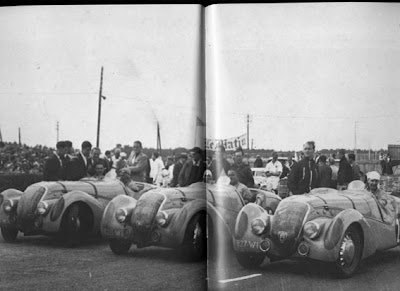There were several famous design houses specialising in coachwork for cars, including the French firms Letourner & Marchand, Pourtout & Chapron, and Figoni & Falaschi. It's these cars which I am most interested in collecting, but across the Atlantic some wonderful examples by Cord, Auburn, Packard and several others were also being built, so a collection of all the Art Deco cars could become a very expensive and beautiful obsession. For starters, however, I'm sticking to France.
 |
| Delahaye 165, 1938 model with coachwork by Figoni & Falaschi. The model is by IXO, 1:43. |
 |
| Powered by an alloy, 4.5 litre, 60° V12, the car was essentially a production version of the Delahaye 145 V12 race car. |
 |
| These IXO models aren't expensive, but they look great in the cabinet. Unfortunately for me, there is another Art Deco Delahaye that I want, but the models of it cost somewhere north of $300, while my cheap little IXOs each cost me about $30, more my budget zone. However, I did find a nice You Tube piece on the Unobtainable Delahaye, and here it is, the car once owned by British starlet Diana Dors. Car and girl, perfect combo. (You'll have to endure a little 10-second ad at the start, unfortunately) |
 |
| Talbot Lago T150 CSS, 1937 to 1939, with bodywork by Figoni & Falaschi. Like the other cars in today's posting, it's 1:43 by inexpensive IXO. |
 |
| Powered by a 4-litre in-line OHV straight six, it had the nickname of 'The Teardop' as its designer said it was based on a drop of water. |
 |
| As soon as he laid eyes on this car, the Chairman of Bentley, Wolf Barnato, placed an order for one. I know how he feels. And now, again courtesy of You Tube, is a walk around this car. I love the little details like the hand- made set of luggage in the back. What a lovely driving holiday! |
 |
| Delage D8 120, 1939 model, with bodywork by Letourner & Marchand. |
 |
| It was powered by a straight eight 4.7 litre OHV engine. The design house Pourtout & Chapron also made a wonderful Art Deco body for this car. |
 |
| Tatra weren't the only company putting stylish aerodynamic fins on their cars – everyone was doing it back then, including this shy little fin by Delage. |
 |
| Emile Darl'Mat made special bodies for his souped-up Peugeots all through the 1930s, and then again in the late 40s, with his Peugeot 203 Darl'Mat. |
 |
| I love the decorative detailing down the side of the bonnet and the flying wings on the rear wheel covers. |
 |
| This model is a 1:43 made by Altaya, the Spanish company. |
 |
| The Darl'Mats distinguished themselves in long-distance racing, such as the 24 hours of Le Mans. This dodgy looking scan is from my book 'Peugeot, sous le signe du Lion' by Pierre Dumont. It's written in French, but thankfully with the picture captions also in English, and it's a treasure trove of Peugeot stuff. |
 | |
| Turn over the page, and here's the Darl'Mat team ready to roll at Le Mans in 1937. If my translation is correct, they all finished, and came 7th, 8th and 10th in their class in 1937, at an average speed of 114.2 km/h for the 24 hours. |
And so my search goes on for Art Deco cars, as there are many more that I could add to my cabinet, if my budget can stretch that far. Of course many modern car companies still look upon body design for their cars as a form of sculpture, but there's something very feminine and romantic about the Art Deco period that just appeals to me the most – it was a Golden Age of the art of body design for me.
The real Talbot and Delahaye are here. I don't know much about them but I certain do appreciate their art deco-ness. They are magnificent and awe-inspiring in real life.
ReplyDeletehttp://karakullake.blogspot.com/2010/08/mullin-automotive-museum-review-part-1.html
this art is really awesome.
ReplyDeleteso cute!!. little cars!
_________________________
Performance Motorcycle Parts
http://ccmachines.com/